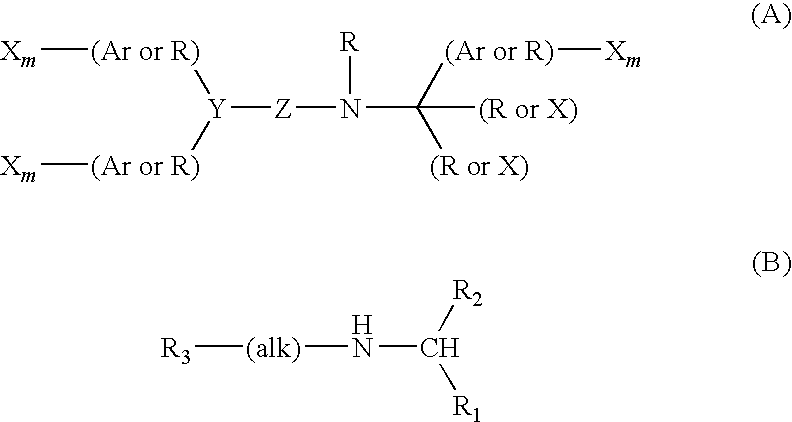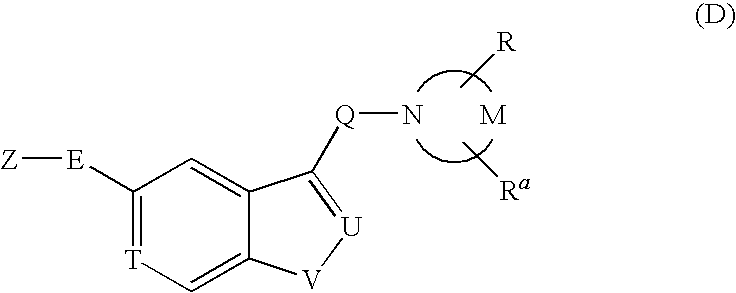Pyrrolidine derivative or salt thereof
a pyrrolidine and derivative technology, applied in the field of medicine, can solve the problems of insufficient treatment, danger of drug-drug interaction, and large problem of secondary hyperparathyroidism, and achieve excellent casr agonistic activity
- Summary
- Abstract
- Description
- Claims
- Application Information
AI Technical Summary
Benefits of technology
Problems solved by technology
Method used
Image
Examples
reference example 1
[0183]In accordance with the method of “Helvetica Chimica Acta”, 2002, vol. 85, no. 11, p. 3616-3623, triethylamine was added under ice-cooling to a mixture of trans-cinnamic acid chloride, (S)-4-benzyl-2-oxazolidinone, lithium chloride and dichloromethane, and then stirred at room temperature for 3 hours. Thereafter, (4S)-4-benzyl-3-[(2E)-3-phenylprop-2-enoyl]-1,3-oxazolidin-2-one was obtained by purifying it in the standard method. FP: 308.
reference example 2
[0184]In accordance with the technique of Ling et al. (“Tetrahedron”, 2001, vol. 57,p. 6579-6588) and the method of International Patent Publication WO 2000 / 59502, a 20 ml dichloromethane solution of 7.3 ml of trifluoroacetic acid anhydride was added under ice-cooling to a mixture of (3R,4S)-3-({[tert-butyl(dimethyl)silyl]oxy}methyl)-4-phenylpyrrolidine synthesized from (4S)-4-benzyl-3-[(2E)-3-phenylprop-2-enoyl]-1,3-oxazolidin-2-one, 21.6 ml of triethylamine and 70 ml of dichloromethane, and stirred at room temperature for 4 hours. The reaction solution was concentrated under a reduced pressure, and the residue was mixed with water, extracted with ethyl acetate and washed with water and saturated brine in that order. The organic layer was dried with anhydrous sodium sulfate and concentrated under a reduced pressure. The thus obtained residue was purified by a silica gel column chromatography (chloroform) to obtain 11.9 g of (3R,4S)-3-({[tert-butyl(dimethyl)silyl]oxy}methyl)-4-pheny...
reference example 3
[0185]A 11.9 g portion of (3R,4S)-3-({[tert-butyl(dimethyl)silyl]oxy}methyl)-4-phenyl-1-(trifluoroacetyl)pyrrolidine was dissolved in 30 ml of THF, and a THF solution of TBAF (1.0 M, 37 ml) was added thereto at room temperature and stirred for 2 hours. The reaction solution was concentrated under a reduced pressure, and the residue was mixed with water, extracted with diethyl ether and washed with water and saturated brine in that order. The organic layer was dried with anhydrous sodium sulfate and concentrated under a reduced pressure. The thus obtained residue was purified by a silica gel column chromatography (chloroform-ethyl acetate) to obtain 6.28 g of [(3R,4S)-4-phenyl-1-(trifluoroacetyl)pyrrolidin-3-yl]methanol as a yellow amorphous substance. FP: 274.
PUM
| Property | Measurement | Unit |
|---|---|---|
| Electrical conductance | aaaaa | aaaaa |
| Temperature | aaaaa | aaaaa |
| Molar density | aaaaa | aaaaa |
Abstract
Description
Claims
Application Information
 Login to View More
Login to View More - R&D
- Intellectual Property
- Life Sciences
- Materials
- Tech Scout
- Unparalleled Data Quality
- Higher Quality Content
- 60% Fewer Hallucinations
Browse by: Latest US Patents, China's latest patents, Technical Efficacy Thesaurus, Application Domain, Technology Topic, Popular Technical Reports.
© 2025 PatSnap. All rights reserved.Legal|Privacy policy|Modern Slavery Act Transparency Statement|Sitemap|About US| Contact US: help@patsnap.com



